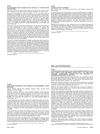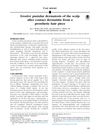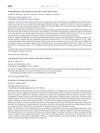 March 2017 in “InTech eBooks”
March 2017 in “InTech eBooks” Acne vulgaris is a common skin condition that can cause low self-esteem and depression, and early treatment is important to prevent scarring.

Chemotherapy can cause skin issues and hair loss, and this guide explains how to manage them.
 January 2012 in “Springer eBooks”
January 2012 in “Springer eBooks” Lupus can cause different skin problems, and treatments like quitting smoking and using certain creams or medicines can help.
 September 2020 in “Journal of Cutaneous Pathology”
September 2020 in “Journal of Cutaneous Pathology” A patient with a skin condition had unusual scarring hair loss but improved with treatment.
 October 2019 in “International journal of research in dermatology”
October 2019 in “International journal of research in dermatology” Misusing topical corticosteroids can cause skin darkening and other side effects.
 May 2002 in “British Journal of Dermatology”
May 2002 in “British Journal of Dermatology” A pregnant woman's skin condition improved after giving birth, possibly due to high estrogen levels during pregnancy.
 273 citations,
May 2017 in “The Lancet”
273 citations,
May 2017 in “The Lancet” Some drugs can cause rare but potentially deadly skin reactions, and early treatment and avoiding the drug again are key.
 191 citations,
February 2002 in “Archives of Dermatology”
191 citations,
February 2002 in “Archives of Dermatology” Some herbal therapies may help with skin conditions, but more research is needed to confirm their safety and effectiveness.
 48 citations,
November 1992 in “International Journal of Dermatology”
48 citations,
November 1992 in “International Journal of Dermatology” Toxic epidermal necrolysis is a severe skin reaction often linked to drugs, requiring careful medication use and supportive care.
 40 citations,
July 2007 in “Dermatologic Therapy”
40 citations,
July 2007 in “Dermatologic Therapy” Systemic glucocorticosteroids are a primary treatment for various skin conditions but require careful management due to potential side effects and relapses.
 30 citations,
January 2013 in “International Journal of Trichology”
30 citations,
January 2013 in “International Journal of Trichology” The most common causes of hair loss in Jordanian children are fungal infections, autoimmune hair loss, and hair shedding after fever, with zinc deficiency also being a notable cause.
 25 citations,
October 2018 in “Journal of The American Academy of Dermatology”
25 citations,
October 2018 in “Journal of The American Academy of Dermatology” Erosive pustular dermatosis of the scalp is a type of skin inflammation often confused with other conditions, requiring continuous treatment.
 16 citations,
March 2005 in “Journal of The American Academy of Dermatology”
16 citations,
March 2005 in “Journal of The American Academy of Dermatology” A boy with Sjogren-Larsson syndrome has skin and muscle symptoms due to a specific enzyme deficiency.
 14 citations,
January 2020 in “Mediterranean Journal of Rheumatology”
14 citations,
January 2020 in “Mediterranean Journal of Rheumatology” New JAK inhibitor drugs show promise for treating skin diseases but need more research on safety and effectiveness.
 7 citations,
April 2021 in “Dermatology and Therapy”
7 citations,
April 2021 in “Dermatology and Therapy” H-1 antihistamines may help with various skin conditions, but more research is needed to confirm their effectiveness.

The chapter explains that there are many genetic skin disorders affecting skin cell formation, including both common and rare types.
 July 2014 in “Disease-a-Month”
July 2014 in “Disease-a-Month” The document gives treatment advice for various skin conditions, like using metronidazole for perioral dermatitis and minoxidil for hair loss.
 January 2003 in “Elsevier eBooks”
January 2003 in “Elsevier eBooks” Androgens and other hormones affect hair growth and skin conditions like acne.
 83 citations,
June 2020 in “Materials & Design”
83 citations,
June 2020 in “Materials & Design” Sponge helps heal wounds faster with less inflammation and better skin/hair growth.
 62 citations,
July 2018 in “Lasers in Medical Science”
62 citations,
July 2018 in “Lasers in Medical Science” LED therapy is safe and shows potential for treating skin conditions and promoting hair growth, but more research is needed.
 29 citations,
September 2017 in “Oncology and therapy”
29 citations,
September 2017 in “Oncology and therapy” The document provides advice on how to recognize and treat skin-related side effects of cancer drugs known as EGFR inhibitors.
 21 citations,
February 2009 in “Journal of the American Academy of Dermatology”
21 citations,
February 2009 in “Journal of the American Academy of Dermatology” Some cases of tinea capitis, a fungal scalp infection, can look like scarring hair loss due to the body's immune response and the fungus itself.
 12 citations,
March 2004 in “International Journal of Dermatology”
12 citations,
March 2004 in “International Journal of Dermatology” A woman with X-linked chronic granulomatous disease developed lupus-like skin lesions, improved with treatment, suggesting a unique skin condition in carriers.
 9 citations,
March 2017 in “JAAD Case Reports”
9 citations,
March 2017 in “JAAD Case Reports” A woman's scalp condition improved with specific ointment after a hair piece caused skin issues.
 6 citations,
November 1999 in “Mycoses”
6 citations,
November 1999 in “Mycoses” A man in Japan got better from a scalp fungal infection using terbinafine.
 6 citations,
May 1993 in “Archives of Disease in Childhood”
6 citations,
May 1993 in “Archives of Disease in Childhood” Children's hair loss can be caused by many factors, including autoimmune diseases, emotional stress, genetics, and infections, with treatment and prognosis varying.
 1 citations,
December 2006 in “Burns”
1 citations,
December 2006 in “Burns” New therapies for burn wounds show promise in reducing pain, infection risk, and improving healing and physical outcomes.
 August 2018 in “Journal of The American Academy of Dermatology”
August 2018 in “Journal of The American Academy of Dermatology” A 90-year-old woman's hand lesion was a rare, aggressive skin cancer treated successfully with surgery.
 June 2011 in “Oncology times”
June 2011 in “Oncology times” Dr. Mario Lacouture recommends preventive and specific treatments for skin side effects caused by EGFR inhibitors to improve patients' quality of life.
 51 citations,
January 2014 in “Pediatric Clinics of North America”
51 citations,
January 2014 in “Pediatric Clinics of North America” The guide explains how to identify and treat children's hair loss, including fungal infections, autoimmune disorders, hairstyle changes, self-correcting conditions, and behavioral therapy for hair-pulling.






























